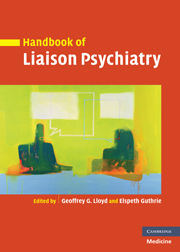Book contents
- Frontmatter
- Contents
- List of contributors
- Preface
- Part I Basic skills
- Part II Common psychiatric problems across the general hospital
- Part III Working with specific units
- Part IV Treatment
- Part V Different treatment settings
- 36 Developing links with primary care
- 37 Frequent attenders in primary care
- 38 Major disaster planning
- Index
- References
36 - Developing links with primary care
from Part V - Different treatment settings
Published online by Cambridge University Press: 10 December 2009
- Frontmatter
- Contents
- List of contributors
- Preface
- Part I Basic skills
- Part II Common psychiatric problems across the general hospital
- Part III Working with specific units
- Part IV Treatment
- Part V Different treatment settings
- 36 Developing links with primary care
- 37 Frequent attenders in primary care
- 38 Major disaster planning
- Index
- References
Summary
Introduction
Most liaison psychiatry is practised in the general-hospital setting, but increasingly services for the physically ill are becoming community based. Family practitioners play a key role in identifying patients with comorbid physical and psychological distress. This chapter describes the developments over the last 10 years in the detection and treatment of patients with medically unexplained symptoms in a primary-care setting.
Medically unexplained symptoms in primary care
Medically unexplained symptoms (MUS) are defined as physical symptoms that doctors cannot explain by physical pathology, which distress or impair the functioning of the patient (Peveler et al. 1997). Patients with MUS seek help from the family doctor and are frequently unwilling to consult mental health professionals or non-medical personnel because many of these patients believe that they have a physical health problem (Kirmayer & Robbins 1996). Around 75% of patients with MUS persisting for more than six months (persistent medically unexplained symptoms or PMUS) are still distressed and/or functionally impaired by them 12 months later (Kroenke & Spitzer 1998; Moore et al. 2000). Persistent MUS is the most common reason for frequent attendance to the family doctor (Jyvasjarvi et al. 1998), and a frequent source of family doctor frustration (Mathers & Gash 1995). Family doctors express lower satisfaction with care for patients with PMUS than patients with psychological problems (Hartz et al. 2000).
Keywords
Information
- Type
- Chapter
- Information
- Handbook of Liaison Psychiatry , pp. 847 - 870Publisher: Cambridge University PressPrint publication year: 2007
